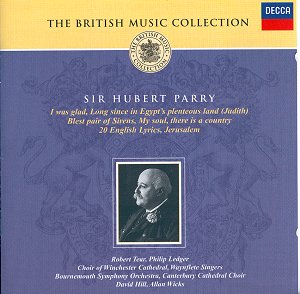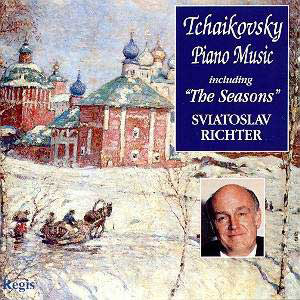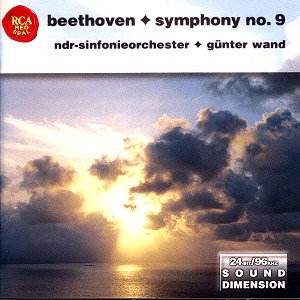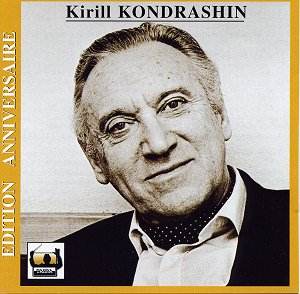 Composer: Sir Charles Hubert Hastings Parry (1848-1918)
Composer: Sir Charles Hubert Hastings Parry (1848-1918)
Works: I was Glad (orch. Gordon Jacob), Long since in Egypt’s plenteous land (from Judith), Blest pair of Sirens (orch. Edward Elgar), Songs of Farewell: My soul, there is a country, English Lyrics: Bright Star, When comes my Gwen, O mistress mine, Blow, blow, thou winter wind, A Welsh lullaby, When lovers meet again, On a time the amorous Silvy, When we two parted, Love is a bable, Weep you no more, When icicles hang by the wall, Looking backward, Take, o take those lips away, There be none of beauty’s daughters, And yet I love her till I die, From a city window, Thine eyes still shine for me, Marian, No longer mourn for me.
Performers: Robert Tear (tenor), Philip Ledger (piano), Choir of Winchester Cathedral, Waynflete Singers, Bournemouth Symphony Orchestra/David Hill
Recording: Recorded in Winchester Cathedral, June 1990, and Canterbury Cathedral, October 1983
Label: DECCA
Sir Charles Hubert Hastings Parry, a luminary of the late Victorian and Edwardian musical landscape, is often overshadowed by contemporaries like Elgar and Vaughan Williams. This compilation from Decca, part of the British Music Collection, offers a significant glimpse into Parry’s stylistic breadth, encompassing both his choral masterworks and his more intimate songs, revealing the composer’s deft interplay between lyrical expressiveness and harmonic innovation. The juxtaposition of grand choral works like “I was Glad” with the delicate, contemplative “Songs of Farewell” illustrates Parry’s versatility and the depth of his emotional palette.
Robert Tear’s performance of the English Lyrics provides an illuminating lens through which to appreciate Parry’s songwriting. His voice, bright and vibrant, is particularly suited to the lyrical nature of these works. While some songs reveal a touch of the less distinguished material, Tear navigates the landscape with a commendable clarity and a range of expressive devices, enriching the textural fabric of Parry’s music. The setting of “O Mistress mine” shines as a highlight, where Tear’s interpretation encapsulates both charm and poise. Similarly, “When we two parted” benefits from his robust vocal color, imbuing the piece with a palpable sense of regret. Yet, there are moments where his delivery seems constricted, hinting at the inherent challenges of sustaining emotional authenticity across Parry’s more demanding vocal lines.
The recorded sound quality merits mention, as the engineering captures the reverberant splendor of the venues—Winchester Cathedral and Canterbury Cathedral—imparting an ethereal quality to the choral works. David Hill’s direction of the combined choirs is commendable, particularly in “I was Glad,” where the interplay of voices and orchestral forces creates a sonorous tapestry. However, the blending of the choirs in “Blest Pair of Sirens” occasionally falters; individual voices emerge sharply, detracting from the intended cohesiveness of the choral sound. The orchestral accompaniment fares well, with fine string playing that complements the choral lines, particularly in “Long since in Egypt’s plenteous land,” where dynamics and phrasing are executed with precision.
Comparatively, this collection stands alongside other notable recordings of Parry’s works, such as those by the BBC Symphony Orchestra and the London Philharmonic, yet it offers a unique perspective through its focus on the intimate and lyrical facets of his output. The recorded performances of “Songs of Farewell” are particularly commendable for their emotional depth and articulate phrasing, with “From a city window” emerging as a standout, marked by its artful tenderness and soft delivery.
This release encapsulates Parry’s duality as both a grand choral architect and a sensitive songsmith. Tear’s performances, while occasionally faltering, bring an essential vibrancy to the English Lyrics, and the choral works resonate with a majestic yet heartfelt clarity. The engineering deftly captures the acoustics of the recording spaces, enhancing the overall listening experience. Ultimately, this collection is a valuable contribution to understanding Parry’s artistic legacy, reaffirming his place within the canon of English music as both a craftsman of profound choral works and a tender melodist.



